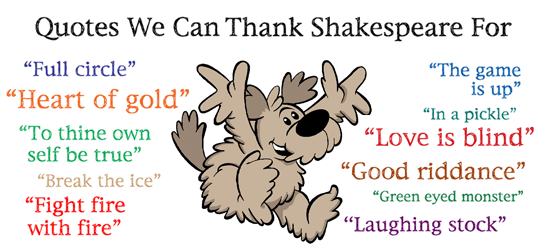How many words do you know?

April 23rd is United Nations English Language Day. This date was chosen because it is Shakespeare’s birthday (thought to be 23rd April 1564). Shakespeare’s plays and poems have had an enormous impact on the development of the English language. The origin of many words and phrases that are commonly used in our language today can be found in Shakespeare’s works. The image highlights just a few of them.
With a potential of 1-2 million words available for use within the English language, and a new word being created every 98 minutes, it is difficult for any human being to know them all. However, a good knowledge of words, and being able to use them in context, is a vital part of your child’s education. Having an extensive vocabulary not only helps children to properly understand questions they are being asked but also helps them to frame their answers clearly and succinctly.
There is a growing concern across the country about illiteracy rates among children. This must be tackled, as being able to read is essential in gaining access to the whole school curriculum. However, even if a child can read, their knowledge of vocabulary and their ability to spell correctly is also crucial. In 2009, the BBC ran an article in their Magazine highlighting that children in the UK are suffering from ‘word poverty’. There are many reasons for this phenomenon but ‘text-speak’ is certainly one of them. Many children are using mobile devices and shortening words for ease and speed of communication. They are also increasingly relying on spelling correction programs on their computers whilst word processing documents. Both of these modern trends lessen the requirement to learn and remember how to spell words correctly.
Another issue that has contributed to this problem is the fact that children do not read enough fictional books that are sufficiently challenging. Research conducted in 2013 on a quarter of a million people in the UK found that there is ‘a direct correlation between reading habits and vocabulary size’. This especially applies to those who read good quality fiction. This is because a greater variety of words are used in novels than in non-fiction books.
The research shows that a person who reads regularly has 8,000 more words in their word bank than someone who does not. Additionally, it was discovered that the vocabulary growth of 4-15 year olds was +4.1 words per day for those who ‘read lots’ versus +1.4 words per day for those who do not read much. By the age of 15, the difference in word knowledge between these two groups can be as great as 5,000 – 6,000 words. To summarise; this means that children who read a lot have a vocabulary that is almost twice the size of those who do not.
AE Publications’ Spelling & Vocabulary and Semantics workbooks are a useful way of supplementing your child’s reading programme. They ensure your child uses a word in context and learns its dictionary definition. These books use fun exercises to facilitate spelling and vocabulary skills and will also add to their enjoyment of reading more challenging books, as they will not have to constantly consult a dictionary.

